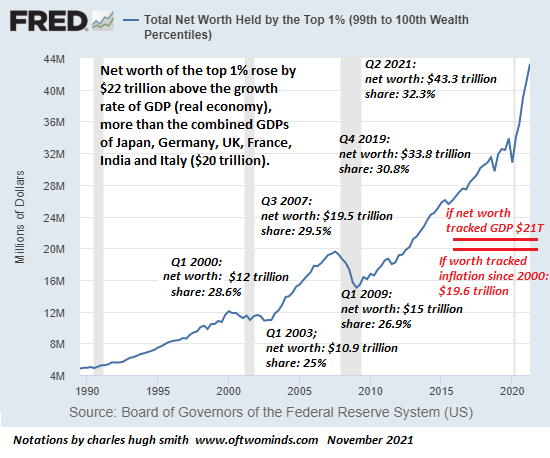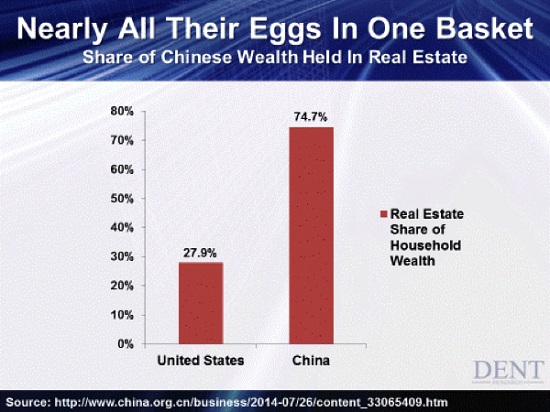This desire for compliance and consensus dooms the autocracy to failure and collapse because dissent is the essence of evolutionary churn and adaptation..The various flavors of autocracy (theocracy, kleptocracy, dictatorship, etc.) look remarkably successful at first blush but they all share a fatal flaw. To understand the flaw we must start with the dominant dynamic of all organisms, natural selection. Things change. Those organisms which adapt quickly and successfully survive, those that don’t perish. Things change for many reasons and over different timespans. Drought slowly but surely makes regions unlivable for all the but hardiest creatures. A meteor strike can ruin an entire species’ prospects. I try not to get too philosophical here, but bear with me
Topics:
Charles Hugh Smith considers the following as important: 5.) Charles Hugh Smith, 5) Global Macro, Featured, newsletter
This could be interesting, too:
Nachrichten Ticker - www.finanzen.ch writes Die Performance der Kryptowährungen in KW 9: Das hat sich bei Bitcoin, Ether & Co. getan
Nachrichten Ticker - www.finanzen.ch writes Wer verbirgt sich hinter der Ethereum-Technologie?
Martin Hartmann writes Eine Analyse nach den Lehren von Milton Friedman
Marc Chandler writes March 2025 Monthly
Things change. Those organisms which adapt quickly and successfully survive, those that don’t perish. Things change for many reasons and over different timespans. Drought slowly but surely makes regions unlivable for all the but hardiest creatures. A meteor strike can ruin an entire species’ prospects.
I try not to get too philosophical here, but bear with me because this is an important point: selection isn’t teleological, meaning that selection isn’t working toward a goal or end-point, it is entirely contingent, solely responsive to the environment that exists today. There is no “plan” guiding what’s selected to what we imagine is “better;” what’s selected is whatever offers an advantage given the selective pressures of the moment. If water is scarce, mutations that enable the organism to get by on less water have selective advantages.
 DNA, RNA, epigenetics and human cultures generate random mutations (i.e. a variety of experiments), and those that offer a beneficial response to a selective pressure are selected and eventually spread through the gene pool or populace.
DNA, RNA, epigenetics and human cultures generate random mutations (i.e. a variety of experiments), and those that offer a beneficial response to a selective pressure are selected and eventually spread through the gene pool or populace.
A funny thing happens when adaptation and evolutionary advantages are snuffed out: whatever can’t change expires as what was functional in the past becomes dysfunctional as things change.
Autocracies view change they don’t directly control as a threat to their power, which is absolutely correct: any change outside the autocrat’s control can end up toppling the autocracy as waves of change ripple outward and interact with various systems. One domino falls and topples many others, and soon the entire system is no longer within the control of the autocrats.
You see the problem here: adaptation is necessary for survival, and successful adaptation requires a steady churn of random experiments which are left to run so that the best are selected and conserved and the failures set aside.
But the churn of random experiments is anathema to autocracies, which must control everything lest their power be disrupted. So the autocrats want control of all the experiments and of the selection process. They will select whatever they judge to be supportive of their power and their regime.
But that’s not how successful adaptation works; that’s how unsuccessful adaptation works. The very act of controlling everything disables the entire process of evolutionary churn and adaptation. Choosing what’s selected based on a limited and thus fatally distorted view of what will support the autocratic status quo also disables adaptation.
Autocracies cannot allow evolutionary churn to operate freely enough to enable their regime to adapt to changes. By throttling evolutionary churn–dissent, variety, experiments across the board in all fields–autocrats doom their regime to failure and collapse. The irony is their tight grip on power is their undoing.
Autocrats have a second fatal flaw: they want agreement and confirmation, not dissent. Once the autocrat decides that this set of policies will support the regime’s control, then dissent is unwelcome.
This desire for compliance and consensus dooms the autocracy to failure and collapse because dissent is the essence of evolutionary churn and adaptation. Surround yourself with sycophants and toadies, crush dissenting views, and you’ve sealed the fate of your autocracy:
Eventually a meteor strikes and the least adaptive organisms and regimes expire. You can fool Nature for a time with brute force, but autocratic force is no match for evolutionary churn and the fast adaptation only available to those who welcome and reward liberty, experimentation and dissent.
The more dramatic the change, the greater the selective pressure. If we’re entering an era of massive, non-linear disruption, those who have crippled their evolutionary churn as a threat will be the first to collapse–no matter how mighty they appear in the moment.
Tags: Featured,newsletter








